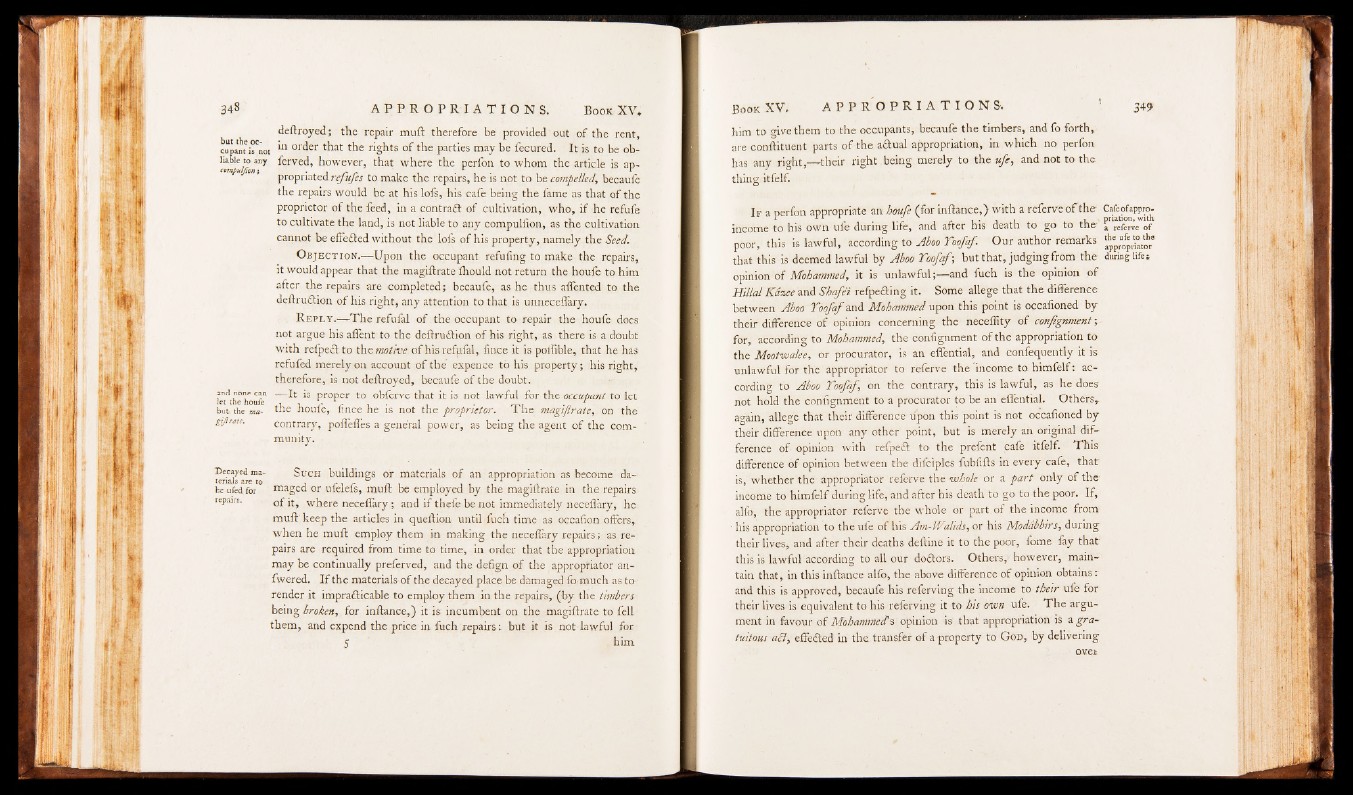
but the occupant
is noi
liable to any
cempuljion;
and none can
let the hou/e
but the magiftrate.
Decayed materials
are to
be ufed for
repairs.
deftroyed; the repair muft therefore be provided out of the rent,
t hi order that the rights of the parties may be feeured. It is to be ob-
ferved, however, that where the perfon to whom the article is appropriated
refufes to make the repairs, he is not to be compelled, becaufe
the repairs would be at his lofs, his cafe being the fame as that of the
proprietor of the feed, in a contradt of cultivation, who, if he refufe
to cultivate the land, is not liable to any compulfion, as the cultivation
cannot be effefted without the lofs of his property, namely the Seed.
O b j e c t io n .— Upon the occupant refuling to make the repairs,
it would appear that the magiftrate fhould not return the houfe to him
after the repairs, are completed; becaufe, as he thus aflented to the
deftrudtion of his right, any attention to that is unneceflary.
, R e p l y .— The refufal of the occupant to repair the houfe does
not argue his affent to the deftrudtion of his right, as there is a doubt
with refpedt to th& motive of his refufal, fince it is poflible, that he has
refufed merely on account of the expence to his property; his right,
therefore, is not deftroyed, becaufe of the doubt.
— It is proper to obferve that it is not lawful for the occupant to let
the houfe,, fince he is not the proprietor. The magijlrate, on the
contrary, poflefles a general power, as being the agent of the community.
■
S u c h buildings or materials of an appropriation as become damaged
or ufelefs, muft be employed by the magiftrate in the repairs
of it, where neceflary; and if thefe be not immediately neceflary, he
muft'keep the articles in queftion until fuch time as occafion offers,,
when he muft employ them in making the neceflary repairs; as, repairs
are required from time to time, in order: that the appropriation
may be continually preferred, and the defign of the appropriator an-
fwered. I f the materials of the decayed place be damaged fo-much as to-
render it impradticable to employ them in the repairs, (by the timbers
being broken, for inftance,) it is- incumbent on the magiftrate to fell
them, and expend the price in fuch rep a irsb ut it is not lawful for
5 him
him to o-ive them to the occupants, becaufe the timbers, and fo forth,
are conftituent parts of the aftual appropriation, in which no perfon
has any ri°ht,— their right being merely to the ufe, and not to the
thing itfelf.
I f a perfon appropriate an houfe (for inftance,} with a referve o f the1
income to his own ufe during life, and after his death to go to the
poor, this is lawful, according to Aboo Toofaf. Our author remarks
that this is deemed lawful by Aboo Toofaf', but that, judging from the
opinion of Mohammed, it is unlawful;— and fuch is the opinion of
Hillal Kdzee and Shafei refpefting it. Some allege that the difference
between Aboo Toofaf and Mohammed upon this point is occafioned by
their difference of opinion concerning the neceflity of confignment;
for, according to Mohammed, the confignment of the appropriation to
the Mootwalee, or procurator, is an effential, and confequently it is
unlawful fdr the appropriator to referve the'income tohimfelf; according
to Aboo Toofaf, on the contrary, this is lawful, as he does
not hold the confignment to a procurator to be an effential. Others,,
again, allege that their difference upon this point is not occafioned by
their difference upon any other' point, but is merely an original difference
of opinion with refpedt to the prefent cafe itfelf. This
difference of opinion between the difciples fubfifts in every cafe, that
is," whether the appropriator referve the whole or a part only of the
income to himfelf during life, and after his death to go to the poor. If,
alio, the appropriator referve the whole or part .of the income from
■ his appropriation to the ufe of his Am-lValids, or his Moddbbirs, during
their lives, and after their deaths deftine it to the poor, fome fay that
this is lawful according to all our doctors. Others,1 however, maintain
that, in this inftance alfo, the above difference of opinion obtains r
arid this is approved, becaufe his referving the income to their ufe for
their lives is equivalent to his referving it to his own ufe. The argument
in favour of Mohammed?s opinion is that appropriation is a. gratuitous
apt, effedted in the transfer of a property to G o d , by delivering
over
Café of appropriation,
with:
a referve of
the ufe to the
appropriator
during life v